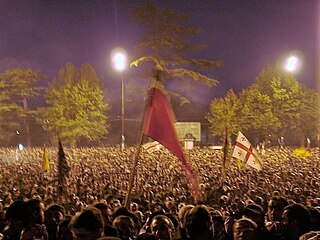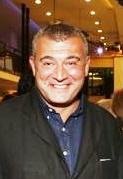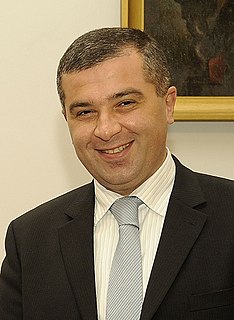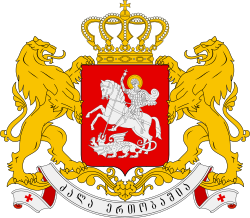
A presidential election was held in the Republic of Georgia on January 4, 2004. The election followed the resignation of former President Eduard Shevardnadze. As expected, the main opposition leader, Mikhail Saakashvili, was soon shown by exit polls to be heading for an overwhelming victory. According to preliminary results issued on January 6 by Georgia's Central Election Commission, Saakashvili won over 97% of the votes cast.

Parliamentary elections were held in Georgia on 2 November 2003 alongside a constitutional referendum. According to statistics released by the Georgian Election Commission, the elections were won by a combination of parties supporting President Eduard Shevardnadze.

The Union of Citizens of Georgia was a centre-left political party established by Eduard Shevardnadze, President of Georgia from 1992–2003 and David Chantladze, former General Trade Representative of the Soviet Union to Czechoslovakia. It was established in the mid-1990s as a vehicle for modernising politicians. It became the majority grouping in the Georgian parliament following the parliamentary elections of November 1995, with Shevardnadze winning the presidency at the same time.

Legislative elections were held in the Georgia on 28 March 2004. The elections followed the annulment of the November 2003 legislative elections, which were widely believed to have been rigged by the former President, Eduard Shevardnadze. New elections were ordered following the resignation of Shevardnadze and the election of President Mikhail Saakashvili in January 2004.

The Revolution of Roses, often translated into English as the Rose Revolution, describes a pro-Western peaceful change of power in Georgia in November 2003. The revolution was brought about by widespread protests over the disputed parliamentary elections and culminated in the ousting of President Eduard Shevardnadze, which marked the end of the Soviet era of leadership in the country. The event derives its name from the climactic moment, when demonstrators led by Mikheil Saakashvili stormed the Parliament session with red roses in hand.

Industry Will Save Georgia is a centre-right conservative political party in Georgia.

The Ukrainian parliamentary election took place on 26 March 2006. Election campaigning officially began on 7 July 2005. Between November 26 and 31 December 2005 party lists of candidates were formed.

Presidential elections were held in Georgia on 5 January 2008, moved forward from autumn 2008 by President Mikheil Saakashvili after the 2007 demonstrations.

Levan Gachechiladze is a Georgian politician and businessman who ran as the main oppositional candidate in the 5 January Georgian presidential election, 2008.

Davit Bakradze is a Georgian politician and diplomat who served as the Chairman of the Parliament of Georgia from June 7, 2008, to October 21, 2012.

The Republican Party of Georgia, commonly known as the Republicans, is a political party in Georgia active since 1978. Until March 2016, the party was a part of the Georgian Dream coalition that won the 2012 election, defeating the United National Movement.

The Georgian parliamentary election of 2012 was held on 1 October 2012 in Georgia. It was the 7th legislative election held since independence from the Soviet Union in 1991. The opposition Georgian Dream coalition of billionaire businessman Bidzina Ivanishvili won a majority of seats. President Mikheil Saakashvili conceded his party's loss.

Presidential elections were held in Georgia on 27 October 2013, the sixth presidential elections since the country's restoration of independence from the Soviet Union in 1991. The last elections in January 2008 resulted in the re-election of Mikheil Saakashvili for his second and final presidential term. Saakashvili was constitutionally barred from running for a third consecutive term.
The Georgian local self-government election, 2014, was held on June 15, 2014, to elect the councils of local government, sakrebulo, and the Mayor of Tbilisi, the capital of Georgia.
Shota Malashkhia is a Georgian politician and the member of the Parliament of Georgia of the 8th convocation from the United National Movement party (UNM). In June 2013, he was named as one of the candidates for the 2013 UNM presidential nomination.
Opposition Bloc is a Ukrainian political party that was founded in 2014 as six parties that did not endorse Euromaidan merged. Legally, the party was created by renaming the lesser-known party Leading force.

Presidential elections were held in Georgia on 28 October 2018, the seventh presidential elections since the country's restoration of independence from the Soviet Union in 1991. The previous elections in October 2013 resulted in a victory for Giorgi Margvelashvili, a candidate of the Georgian Dream coalition.


















